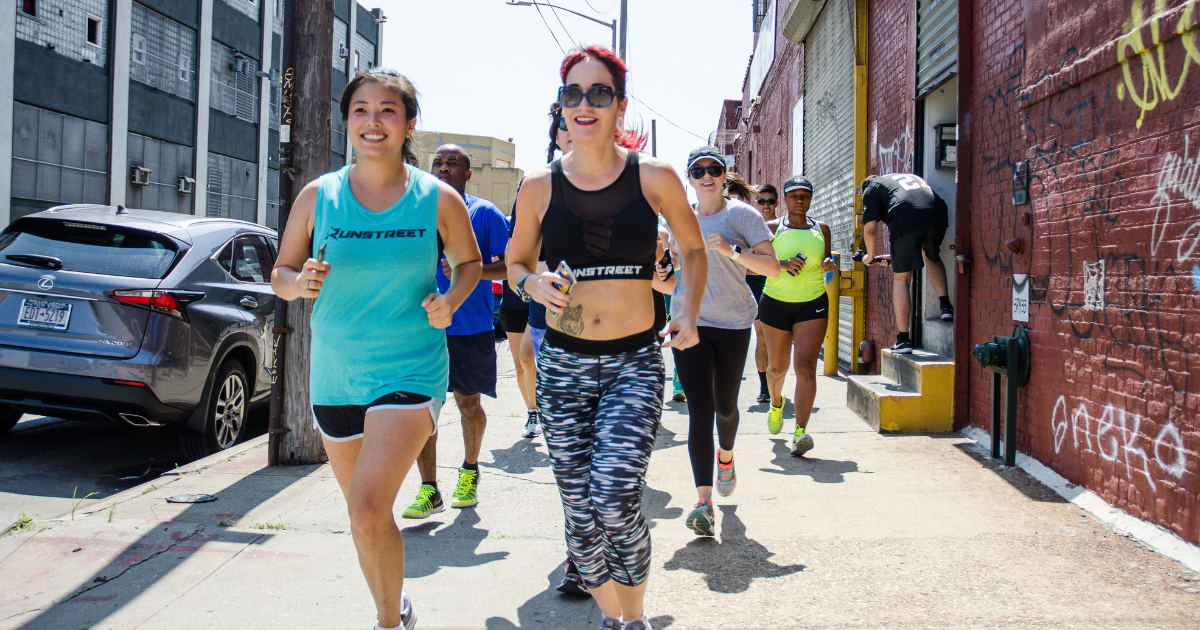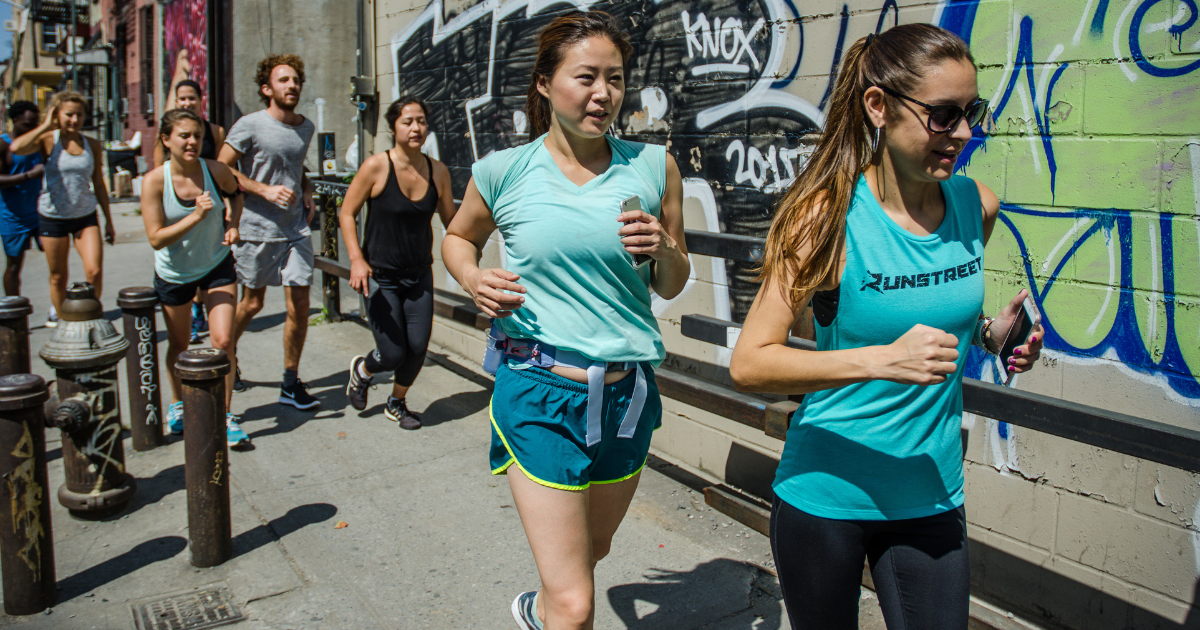How Far is a 5K in Miles? 5K Training Guide
Photos by Marques Jackson Photography.
By Marnie Kunz, NASM-certified trainer, USATF- RRCA-certified run coach
If you’re wondering how far is a 5K in miles and other 5K questions, you’ve come to the right place. As a running coach and longtime runner, I have run and coached many people for 5K races. This guide will go over everything you need to know about 5K running, and I’ll offer my best tips for 5K training. If you’d like a free beginner’s 5K training plan, check out our Couch to 5K Training Program.
Related Post: Couch to 5K Training Guide with Free Printable Plan
How Far is a 5K in Miles?
So how far is a 5K in miles? A 5K is equal to 3.10686 miles, about 3.1. The 5K race distance is the most popular race distance around the world. For Americans, who are used to measuring distance with the Imperial system, the metric system, using kilometers, can be confusing. But being a runner helps! You’ll quickly learn the popular race distances in kilometers and miles. A 5K in miles is 3.1 miles.
In addition to 5K, here are some other popular race distances with their distance in kilometers and miles, for reference:
5K = 3.1 miles
10K = 6.2 miles
Half marathon = 21 kilometers = 13.1 miles
Marathon = 42.195 km = 26.2 miles
Related Post: Average 5K Time and How to Get Faster
How to Train for a 5K
Training for a 5K may seem overwhelming, but with a good training plan and some consistent effort, you can do it. If you’re a new runner, you can train for a 5K race by gradually building your endurance. Walkers and beginner runners can check out our Couch to 5K Training Plan for a free program that uses running and walking intervals to build your stamina until you can run a full 5K without stopping.
All levels - from beginners to experienced runners - can benefit from a training plan as it gives you the blueprint for success. A well-planned program will include warm-up suggestions, relaxed pace base runs, and strength training to help your bones and muscles get stronger so you can run better. Strength training and building your mileage gradually reduces your risk of injury.
Rest days are also a crucial part of 5K training and should be included in your plan. Everyone from beginners to advanced runners can benefit from rest days to allow your body time to recover from workouts.
If you’re an intermediate runner, speed workouts will help you get faster and improve your 5K race pace. Some excellent speed workouts for 5K training include intervals and tempo runs. Interval training involves short bursts of speed mixed in with periods of recovery, usually with slow jogging.
A 400-meter interval workout is one of the best beginner-friendly speed workouts to help 5K runners. If you’re running on a standard outdoor track, 400 meters is one lap around the track. A simple 400-meter speed workout can include two laps to warm up, followed by alternating one fast lap and one slow lap to recover. Repeat to do at least four fast intervals before cooling down.
Fartleks are also a form of interval training that includes short bursts of intense running during an otherwise relaxed pace run. These are a great way for new runners to ease into speed workouts. If you’re new to running, before you do speed training, give yourself plenty of time to build your fitness level and endurance with at least six weeks of regular running.
Sample 5K Training Schedule
Here is a sample 5K training schedule:
Monday: 3 miles base run
Tuesday: Cross training plus strength training
Wednesday: Rest day
Thursday: 2 miles base run
Friday: Speed workout - 4 X 400-meter intervals plus 800-meter warm-up and cool-down.
Saturday: Rest day.
Sunday: Cross training plus strength training
Your 5K plan should be based on your current fitness level and goals. For personalized 5K training plans to help you crush your running goals, head to the Runstreet Training Center.
5K Training Tips
Here are my top coaching tips to help you have strong and successful 5K training sessions:
Follow a training plan. A program designed by a running coach will build your fitness level gradually, reducing your risk of injuries. A plan will also help you achieve your running goals.
Pick a race to train for. Browse your local track club sites for races. You can also Google 5K races in your area or look on Find a Race. Check out 10 Unique 5K Races to Add to Your Bucket List for more inspiration.
Track your progress. Use a running tracking app or smartwatch to keep track of your daily and weekly mileage. This will help you stay motivated and show your progress as you build your endurance and running distance.
Hit the trails, track, or treadmill at least once a week. This gives your joints and muscles a break from the intense impact of running on concrete and paved surfaces. Trail running is such a fun way to mix up your running routine and get inspired by the beauty of nature.
If you miss a workout, don’t beat yourself up. Just get back on track with your next workout.
Make a killer playlist to get pumped up for your runs. This will help you push through challenging workouts.
Run with a friend or join a local running group. Having people to run with makes running more enjoyable and also helps you stay accountable.
Reward yourself for meeting your milestones. If you struggle to stay consistent and finally get in all your workouts for a week, give yourself a pat on the back. You are doing awesome! Some fun rewards may be a self-care day, a massage, a book you’ve been wanting to read, or a hiking adventure.
5K Race Day Tips
So you’ve put in the work and it’s time for your 5K race. These tips will help you have an excellent race day:
Eat your usual breakfast. Don’t try experimenting with food before your race. Stick to the foods you’re used to eating before running.
No new shoes or clothes on race day. New gear can cause chafing, blisters, and discomfort. Stick to your tried and true comfortable running shoes and clothes for a great race.
Arrive early so you have at least an hour to warm up and use the restroom before your race.
Focus on the process. Think beyond just your race time or place and focus on feeling strong and enjoying the race. Try to keep a positive mindset and you’ll have a much better experience.
Celebrate your achievement! Most people can’t run a mile, and running a 5K is a great accomplishment that takes discipline and mental strength.
Are you training for a 5K? Sign up for our free Wellness Wednesday newsletter for training tips, deals, and free coaching advice. Need a 5K training plan? Head to the Runstreet Training Center. Follow and tag @Runstreet on Instagram to share your running journey and get cheered on.
Happy running to you!
Related Posts: 10 Tips to Run Your Fastest 5K, Beginner 5K Training Plan from a Run Coach
Marnie Kunz is a NASM-certified personal trainer and USATF- and RRCA-certified running coach based in Brooklyn, NY. Marnie likes helping people get and stay active to enjoy a better quality of life. When she’s not doing fitness things, Marnie enjoys exploring with her dog, a mischievous rescue Akita.




